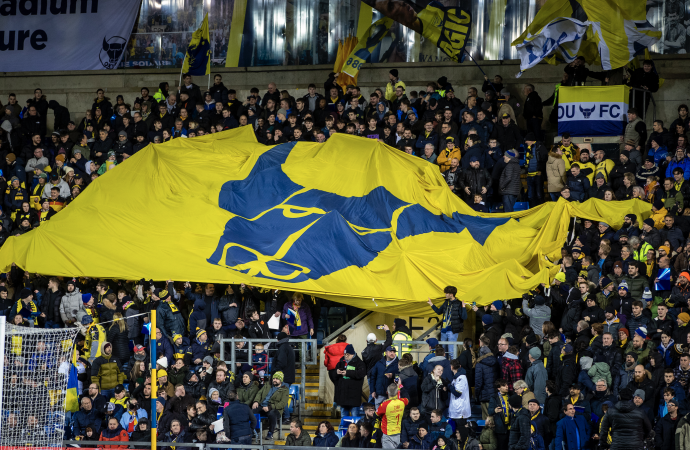We need to join the dots between elite sport and the welfare of animals represented by clubs and teams, says Ian Curtis
I’m going to fly a kite. It’s about an extraordinary opportunity for the world’s wildlife. An opportunity within our sports culture which is largely hidden. Why this kite? Because after 40 years of playing sport and working for nature, I see our wildlife is being hammered. Out of the ground.
According to Our World in Data at the University of Oxford, “our” livestock (cows, pigs, sheep, etc) account for 62% of the world’s mammal biomass; we humans make up a further 34%; and wild mammals are now just 4%.
That’s not a good scoreboard. And the clock ticking down doesn’t help. A huge cultural effort is needed to get wildlife back in shape, alongside any science, government policy, nature conservation fieldwork, business innovation – plenty of cross-field passes must be played. Otherwise we will be praying for extra time.
On New Year’s Day, an idle distraction was the UK’s Honours List. Four Lionesses from the victorious England Women’s Football Team – Leah Williamson, Beth Mead, Lucy Bronze and Ellen White – were awarded a spread of OBEs and MBE’s. Their fantastic coach, Sarina Wiegman, became a CBE on the “overseas list”. These awards follow hard on the heels of success at BBC’s Sports Personality of the Year. What a year and so well deserved.
But wait. There’s another Lioness in the Honours List. Virginia McKenna. Co-star of the epic award-winning film Born Free, about a real-life couple who raised Elsa the Lioness, an orphaned lion cub, to adulthood and released her into the wilderness of Kenya.
Worth joining some dots.
In July 2022, when England’s women’s team won their European Championship Final, there were around 20,000 African lions in existence. Compared to when the men’s team last won the world cup in 1966, there were 100,000 – and research suggests another possible 50% decline over next two decades, with the lion no longer playing a pivotal role as “apex predator”.
The men’s FIFA World Cup 2022 in Qatar was positively roaring with lions – and other wildlife. The Atlas Lions (Morocco), the Indomitable Lions (Cameroon), The Lions of Teranga (Senegal) paced up and down the pitches, and chanted in the stands, eye-to-eye with the Tigers of Asia (South Korea), the Eagles of Carthage (Tunisia), and The Falcons (Saudi Arabia). And also, with wonderful symbolism for the plight of our wildlife, the Little Canary of Brazil.
But what an opportunity missed. There was a unique moment in 2022 with the World Cup sandwiched between the global climate COP27 and biodiversity COP15. One of the most watched events in world history sitting on the same bench as the two most critical challenges facing our future. In that one moment, ‘Earth United’ could have passed the ball around the global park. Cultural inswingers, outswingers, one-twos, overhead volleys, nutmegs – even square balls. And unleashed unstoppable shots for the wild.
But not only did we not pass the ball, we picked the ball up and took it home with us. In July last year the executive secretary of the UN Convention on Biological Diversity – effectively team captain for Wildlife Utd – suggested that World leaders must not let the World Cup distract them from attending the simultaneous nature summit, or they faced being embarrassed by the outcome: “All leaders will have to think twice [about the clash between the biodiversity COP and the World Cup]. You can go to the World Cup but what does it mean if there’s no life beyond that when you come back?”
Attilio Tagalile, a sports legend and veteran journalist, saw things differently. He died on 8 July last year – just twenty-three days before the Lionesses would lift the Cup. How he would have loved to see that. In 2014 Tagalile wrote an article in the Tanzanian Daily News about the missed opportunity of naming the country’s national football team the Taifa Stars (National Team).
“Like Malinzi [Tanzania Football Federation president], I always asked myself how could we give the senior national soccer team the name Taifa Stars – meaning [effectively] nothing – when the country had many good names which we could have picked from …the Ngorongoro, … the Serengeti, animals like lions, elephants, rhinos, giraffe? It is common knowledge and indisputable that Tanzania national parks are second to none in the world in terms of population of animals. For instance, we are told that the biggest elephants not only in the continent but in the world are to be found at the Ruaha National Park.
“And as part of advertising the country’s rich wildlife to the world, nothing would have helped this country in such endeavours more. We could have given the senior national soccer team the name of that tall and elegant animal, the giraffe by calling it The Majestic Giraffe or the Roaring Lions of Serengeti and the team’s logo could be a picture of the giraffe’s head or an angry, roaring lion in order to differentiate from that used by England team.”
Tagalile continued: “Tanzanian fans have scores of names from their country’s rich wildlife, rivers and mountains to choose from not only for the senior national soccer team, but also for junior and women’s national teams and that should be done now.”
I’m hoping that he might approve of this tantalising selection of wildlife unleashed on to a football pitch: Arctic Wolves, Cobras, Condors, Eagles, Foxes, Harriers, Hawks, Hyenas, Jaguars (x2), Kestrels, Kites (Black and Red), Leopard, Lionesses, Lions, Meerkats Reds, Owls, Panthers, Scorpions (x3), Sharks, Snow Leopards, Stingrays, Tigers (x2). They are the youth teams for my local club Summertown Stars FC
Imagine what Tagalile might have suggested to the UN Biodiversity executive secretary for a fizzing cross into the goalmouth to the Earth’s Heads of State: “I want you to go to the World Cup Final. And I want you to take this message to your fans – that they are going to come together for Wildlife Utd. That they will create anthems to the wild for their club stadia so that other football and sports fans across the world will join in. That we will come together in recognition of the athletic beauty, passion and skill championed in so many of our logos and nicknames, and that this has come from that same beauty we see in our wildlife. We must and will cherish both.”
Well, it’s not a new idea. Kick the Ball, Save our Wildlife is a project run by UEFA Foundation and WaterforWildlife. Pitch: Maasai Mara, Kenya (world-renowned for exceptional populations of lion, leopard, cheetah and elephant; host to the Great Migration, acknowledged as one of the ten Wonders of the World; neighbour to Born Free territory). Goal: use football as a fun activity for children to learn more about wildlife conservation. Finish: 28 July, 2023, England Lionesses vs Denmark, Women’s Football World Cup.
The Biodiversity executive secretary made their “you face being embarrassed” comments last July while attending the United Nations’ Ocean Conference in Portugal. There was a moment at that conference which received huge applause when deep sea diving legend Sylvia Earle was asked what we need to do to protect society’s least favourite apex predator…..the shark. Her answer: ‘love’. Learning to love and celebrate sharks, rather than fearing them, would make a huge contribution to restoring a healthy ocean ecosystem, she argued.
Great stuff. But did anybody think of bringing on the Sale Sharks, Cape Town Sharks, Beachside Sharks, Summertown Sharks, the Hammerheads or the hundreds of other sports teams joined “at the fin” to the world’s wild oceans? Imagine unleashing that passion (and, on the flipside, which player or fan wants a nickname that has gone extinct or survives only in cages?).
Of course, there is a lot more to this than lovin’ and cheerin’. There’s a scoreboard to be changed. Well, I’ve never met a more inspiring, committed, multi-skilled, high achieving, creative, collaborative, focused, passionate bunch of people than when stepping across the white line. Bring them on!
We must grab the moments left in the wild game. Unleash the Lionesses and their fellow wildlife at this year’s World Cup in Australia and New Zealand; unleash the Rugby and Cricket World Cups and the two-thirds of English Football League clubs with nature in their logos and nicknames. But most of all, unleash the billion-plus fans and players around the world who could look their 10,000-plus wild logos in the eye and whisper “we’re going to do this”.
Ian Curtis is the development officer at the University of Oxford’s Environmental Change Institute and a former professional cricketer










Leave a Comment
Your email address will not be published. Required fields are marked with *